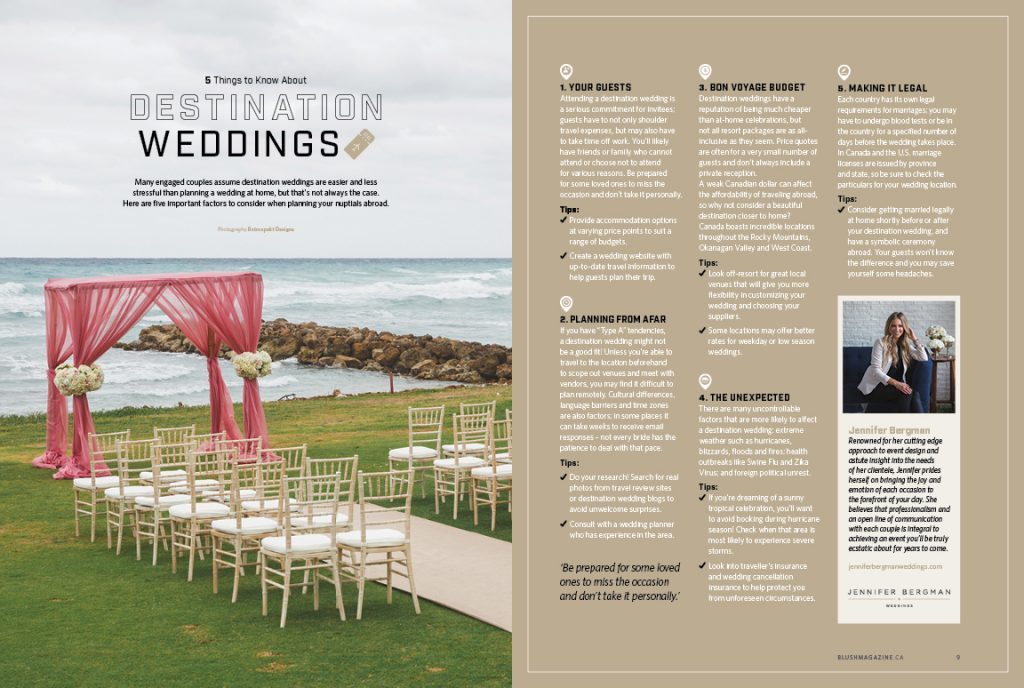5 Things You Need to Know About Destination Weddings
Many people have the impression that destination weddings are easier and less stressful than planning a wedding at home – but that’s not always the case. Here are 5 important factors to consider when planning a destination wedding
1. YOUR GUESTS
Destination weddings ask a lot of your invitees: the cost of travel, of course, and depending on the location guests may have to take time off work to attend your nuptials. You’ll likely have friends or family who cannot attend or choose not to attend for various reasons. Be prepared for some loved ones to miss the occasion and don’t take it personally.
Tips:
-
- Provide accommodation options at different price points to suit a range of budgets.
- Setup a wedding website to convey travel information to your guests to make it easier for them to attend.
2. PLANNING FROM AFAR
If you have “Type A” tendencies, a destination wedding may not be a good fit! Unless you’re able to travel to the location before the wedding to scope out venues and meet with vendors in person, you may find it difficult to make all your plans remotely, especially when cultural differences and language barriers come into play. In some destinations it can take weeks to receive email responses – not every bride has the patience to deal with that pace of planning.
Tips:
- Do your research! Search for real photos from travel review sites or destination wedding blogs to avoid unwelcome surprises.
- Engage the services of a Wedding Planner experienced with weddings in the area.
3. BON VOYAGE BUDGET
It is a common belief that destination weddings are much cheaper than celebrating at home, however tropical resort packages can be deceiving as they are often for a very small number of guests and do not include a private reception.
A weak Canadian dollar can affect affordability of destinations abroad, so why not consider a beautiful destination closer to home? Canada boasts incredible locations throughout the Rocky Mountains, Okanagan Valley and West Coast.
Tips:
- Look off-resort for great local venues that will give you more flexibility in customizing your wedding and choosing your suppliers.
- Some locations may offer better rates for weekday and/or low season weddings.
4. THE UNEXPECTED
Destination weddings are more likely to be affected by factors beyond your control. Examples include extreme weather, such as hurricanes, snow storms, floods and forest fires (we’ve had weddings affected by all of the above); health outbreaks like Swine Flu and most recently, Zika Virus; and foreign political unrest.
Tips:
- If you’re heading somewhere tropical, check when that area is most likely to experience severe storms – in other words, don’t have your wedding during hurricane season!
- Look into getting traveller’s insurance and wedding cancellation insurance.
5. MAKING IT LEGAL
Each country has their own legal requirements for marriages. Some countries mandate blood tests and may require that you’re in the country for a specified number of days before the wedding takes place. In Canada and the U.S. marriage licenses are issued by province / state, so be sure to check the particulars for your wedding location.
Tip:
- Consider getting married legally at home shortly before or after your destination wedding, and have a symbolic ceremony abroad. This can look and feel exactly the same as a legal ceremony so your guests won’t know the difference – and you may save yourselves some headaches.
+ + + + + + + + + + +
As published in the Fall/Winter 2016 issue of Blush Magazine.
Jennifer + Team | Jennifer Bergman Weddings
Edmonton Wedding Planning + Design wigs

